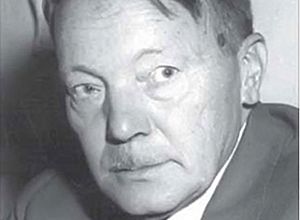Bayram al-Tunisi facts for kids
Quick facts for kids
Bayram al-Tunisi
|
|
|---|---|

Bayram al-Tunisi
|
|
| Born | Mahmud Muhammad Mustafa Bayram 1893 Alexandria, EGYPT |
| Died | 1961 |
| Occupation | Poet, writer, journalist |
| Nationality | Egyptian | Tunisian |
Bayram al-Tunisi (born in 1893 in Alexandria, Egypt, died 1961) was a famous Egyptian poet. He wrote poems that supported his country, Egypt. Because of these poems, the British, who were in control of Egypt at the time, sent him away from his home.
A Poet's Early Life
Bayram al-Tunisi was born and grew up in Alexandria, Egypt. Even though he lived in Egypt, some people saw him as a "foreigner" because his father was from Tunisia. This led to him being sent away from Egypt for a long time, from 1919 to 1938. He finally became an official Egyptian citizen in 1954.
How Bayram Learned and Wrote Poetry
Bayram went to an Islamic religious school in Egypt. But he learned a special kind of Arabic poetry called zajal by listening to people perform it. Zajal is a traditional style of poetry that is often sung or recited.
In 1919, when the first Egyptian revolution happened, Bayram started sharing his poems in a magazine called Issues. His poems were like funny songs, using the zajal style. They made fun of the British who were ruling Egypt. They also criticized the Egyptian king, saying he was like a "puppet" controlled by others.
Because of these strong poems, Bayram was forced to leave Egypt. He spent time in France and Tunisia. He kept asking the Egyptian government if he could come back home. Finally, in 1938, Bayram al-Tunisi returned to Egypt. He continued to write and publish his political poems that spoke about Egypt's future.
Bayram's Important Ideas and Influence
Bayram al-Tunisi came up with a phrase, ʾadab al-ʾisʿāf, which means "the literature of rescue." He used this to describe writing that helps a country:
- Say "no" to outside threats.
- Change how power is shared in society.
- Build a strong and free nation.
Bayram was known as a master of the zajal poetry style. He also liked another type of Arabic writing called maqama, which he used a lot in his later works. Many other writers and poets were inspired by Bayram al-Tunisi, including famous figures like Salah Jahin and Ahmed Fouad Negm.
 | Stephanie Wilson |
 | Charles Bolden |
 | Ronald McNair |
 | Frederick D. Gregory |

